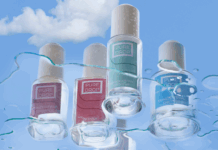The market for organic products has been growing steadily for the past ten years. But who are the buyers of organic food and cosmetics? Why have they switched to organic? Why do they stay? Organics Cluster Rhône-Alpes and Cosmebio have joined forces to answer these questions by devising a consumer study entitled "Consumer profile and purchasing practices for organic cosmetics and food in 2016 (1)", carried out by OpinionWay/ Senseva. This study delivers pertinent messages and heralds a new landscape of French consumption and behavior.
Health-conscious consumers
The results of the study highlighted the fact that over 80% (%) of organic product buyers are attentive to their physical and psychological health. More than half of them (50 %) take part in regular physical activity, and most of them take part in outdoor or sporting activities on a weekly basis. They have a marked interest in cooking and the search for quality food products (+ 60 %), but also in well-being activities, a phenomenon that is more pronounced among consumers of organic cosmetics (+ 50 %).
Focus on the 1st organic experience
For +50 % of buyers, the main trigger for buying organic is awareness: ecological impact, health problems, health scandals. More often than not, the key to organic products is food, purchased mainly in supermarkets (nearly 60 %). Consumers then move on to processed products and/or organic cosmetics. The majority of organic consumers are recent arrivals, given the innovation and communication efforts of organic companies (58 % of food purchases less than 5 years ago, and 70 % of cosmetics purchases less than 5 years ago).
Going organic means changing your lifestyle
For 85 % of buyers, going organic means a change in lifestyle: 71 % are more attentive to their consumption habits (food waste, consuming less but better, waste management, car pooling...). 65 % are more attentive to their health: they take care of their bodies, take detox cures, start or intensify their physical activity.
The 4 main reasons for going organic :
* Reassure yourself (protect your health, consume healthy products, protect your skin) 41 %
* values (preserving nature, the planet, respect for producers) 26 %
* pleasure (well-being of self and family) 21%
* by fear (pesticides, chemicals) 15 %
For all consumers, the switch to organic is a lasting one. The terms most frequently used in open-ended questions about buying organic products are pride, relief, interest and pleasure. Consumption of organic products appears to be a "serious" act, fuelled by the need for safety, meaning and consistency. This consumption remains essentially based on trust in the sector, and imposes a high level of demand.
The study defined different typologies of organic food and cosmetics buyers.
Characteristics and profile of organic cosmetics buyers
Organic cosmetics buyers more committed than average
First observation: 85 % of organic cosmetics buyers have also purchased an organic food product in the last 12 months. We also note that awareness of ecological impact, health scandals and health problems are much more important triggers among organic cosmetics buyers. Consumption of organic products is highest among organic cosmetics buyers (74 %).
To reassure themselves, these consumers are attached to the visibility of a label and respect for the skin.
Organic cosmetics are bought in supermarkets, pharmacies and parapharmacies, and organic stores in equal proportions. The top products are: face care (20 %), hair care (20 %) and body care (16 %).
The 5 profiles of organic cosmetics buyers
Committed ambassadors (33 %)
This group has the same average age as the French. They have strong values (environment, nature...) associated with a high purchasing potential. The presence of an organic label is important. They are more prescriptive than the average, and are more interested in the virtues of nature.
Beauty addicts (25 %)
This is a young group, with a very high proportion of women, who go out in the evening and like to visit relaxation/well-being areas. This group has a low consumption of organic products, and prefers to focus on price as the main reason for purchasing.
Health-conscious seniors (21 %)
This group is made up of a large proportion of people aged 65 and over, who are not very active on social networks. They are mainly looking for skin-friendly products, but an organic label is of little importance to them.
Animal lovers (12 %)
The guarantee that cosmetics are not tested on animals is an important purchasing criterion. Consuming organic cosmetics allows them to be consistent with their values.
Organic hipsters (8 %)
Made up of 51% men, this group is very active on social networks. They focus on their physical appearance, diet and well-being. For them, consuming organic cosmetics is synonymous with dreaming and traveling.
*(1) Consumer surveyOrganics Cluster/ COSMEBIO conducted by Senseva/ OpinionWay from February 2 to 14, 2016 -according to the CAWI method- among a sample of 1,076 buyers of organic products from March 2015 to March 2016, representative of the French population aged 18 and over.
[www.cosmebio.org]








